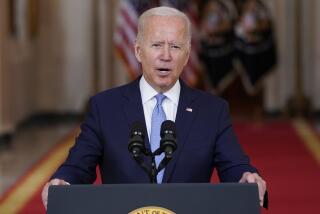WASHINGTON INSIGHT
- Share via
The impact of Iraq’s invasion of Kuwait is rapidly spreading throughout the federal Establishment and officials in Washington are scrambling to keep up.
MAJOR PORTFOLIO: An obscure branch of the Treasury Department won a major new role in high-stakes finance when President Bush froze the U.S. assets of Kuwait and Iraq. Responsibility for those funds fell to the Office of Foreign Assets Control and made its director, Rick Newcomb, one of the most powerful figures in American finance.
No one knows yet just how much money is involved, but Kuwaiti assets are enormous. The Kuwaiti government had interests in or controlled a wide array of private businesses and banks here--in addition to its holdings in cash, Treasury bills and other securities. Newcomb’s office has set up a team to try to identify the holdings.
Now, major transactions by Kuwait-controlled businesses and banks must be approved by Newcomb’s office. The idea, a Treasury spokeswoman said, is to “avoid the leaking of Kuwaiti assets to illegitimate sources,” namely Iraq.
The office supervised past freezes involving the holdings of Iran, Nicaragua, South Africa, Libya and Panama. The United States has not clamped down on the assets of two countries at once since 1940, when the Franklin D. Roosevelt Administration froze the American assets of Germany, and then those of Denmark and Norway after they were invaded by Adolf Hitler.
TAX CALCULATIONS: At the Congressional Budget Office, economists are trying to update their economic forecasts as to just how today’s higher oil prices are likely to affect federal tax revenues.
So far, the answer seems to be not much.
Higher fuel prices are likely to slow economic growth and could bring recession, which would reduce federal revenues. Yet at the same time, higher oil prices also mean greater inflation, which would result in more federal revenues in the short term, said Robert Dennis, an economist and fiscal analyst at the budget office.
On the flip side, he added, the government will face the same inflationary prices as consumers, and as the economy slows, rising unemployment will force the government to pay out more in welfare and other social benefits.
NO BAILOUT: Despite some initial hope that the Iraqis indirectly were going to aid the savings and loan bailout, that bizarre scenario doesn’t look like it will pan out.
The thought was that higher oil prices would boost the value of the Texas real estate held by the bankrupt thrifts. Those assets, many of them currently worth less than the amounts for which they are mortgaged, are held by the Resolution Trust Corporation, the new government agency set up to sell off properties and clean up the nation’s worst financial mess since the Great Depression.
But economists now say that Texas is much less dependent on oil than it once was, and so its economy won’t benefit much from the current run-up in prices.
Oil now accounts for only about 10% of Texas’ economic output, compared with about 25% a few years ago, said Jared Hazelton, director of the Center for Business and Economic Analysis at Texas A&M; University. The oil crash of the 1980s forced the state to diversify, and now it is much more closely tied to the national economy than ever before, Hazelton said. So if the United States enters a recession because of higher oil prices, he said, Texas won’t be far behind.
More to Read
Sign up for Essential California
The most important California stories and recommendations in your inbox every morning.
You may occasionally receive promotional content from the Los Angeles Times.













